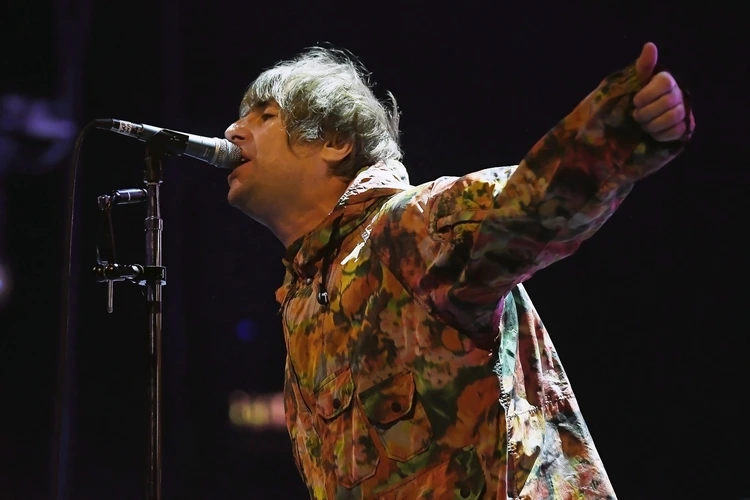

From Motown to Britpop, music has the power to turn a city into a global landmark. In Manchester, Oasis continue to define their city

By
You get a special type of vibe outside a major cultural event – let’s call it a rolling landscape of anticipation. Small clusters of people moving forward merge and become a crowd with a sense of collective purpose. There’s a euphoric edge in the air, that special giddy sense of being part of something bigger than yourself.
On a small scale, you might get this feeling on the way to a party or wedding, but it becomes immersive when you’re in a sea of strangers approaching a sporting event or a gig. I was carried on a wave of collective anticipation along with 80,000 others on my way to an Oasis concert at Heaton Park in Manchester this summer.
Enjoying this article? Check out our related reads:
Has any musical act been as inseparable from a place as Oasis and Manchester? Maybe the Beatles with their warm Scouse accents? Or the parade of iconic and influential Black musicians – including Diana Ross and the Supremes, The Temptations and Stevie Wonder – that made Detroit into Motown? What all these hitmakers tell us is that music moulds human geography.

Not just through the siren call of temporary, spectacular concerts, but as the enduring soundtrack to a way of life, a sense of being in a place. Their instantly recognisable rhythms make somewhere a destination, as much as an iconic landmark like the Eiffel Tower or Statue of Liberty serves as a visual motif for a city.
The Gallagher brothers are not just intrinsically associated with Manchester as
a place but also with the 1990s as an era. From their breakout 1994 record Definitely Maybe, their guitar-led sound and poetic lyrics became emblematic of a period of late-20th-century British revival, creativity and confidence.
A fleeting, time-bound musical and cultural movement they led alongside Blur, and stalwarts like Richard Ashcroft of The Verve and Cast, which ably supported them on their ’25 reunion tour.
The release of Oasis’s underwhelming – merely good – fourth album in 2000 serves as what we might call, in geological terms, a ‘golden spike’ that marked the end of the 1990s Britpop epoch. This millennial end of an era overlapped with my provincial Nottinghamshire school days finishing, and the world opening up into an adulthood of travel, work and university.
The last leg of my journey to hear Oasis this July was a walk up Bury Old Road with my eight best friends from school. We strode up to the park and were subsumed within the gathering crowd of bucket hats and Adidas stripes.
Once inside, I stood in the buzzing audience on a warm summer’s evening with an arm round my mate’s shoulder, a beer in my hand, and a full blast of Champagne Supernova in my ears: I was taken straight back to my teenage years and the glorious misspent moments of the twilight of childhood. Live music is the perfect medium for delivering memories.

Looking back at the concert and my visit to Manchester has left me with a renewed sense of how music makes places, as well as an inescapable ability to summon nostalgia.
I had the time of my life, but also an ache for my past. In the weeks since, what has stuck with me wasn’t just the momentary feeling of being part of a crowd that first anticipated the concert and was later lost in the here and now, as alongside tens of thousands
I was captivated by the peerless tunes of Manchester’s most famous sons, but rather a celebration of the endurance of music in place-making and the value of friendship.
First, then, it’s a renewed appreciation for the indelible bond between Oasis and their city. On my visit, the Northern Quarter was populated with posters and pop-up shops selling merchandise, but even once the Oasis artwork has faded and the storefronts have been shuttered, Wonderwall will still echo out of the bars – even if the Gallaghers have another epic fallout.
Oasis didn’t just help make Manchester the rock and roll ‘Madchester’ of the 1990s, but their decades-old songs are still making the city a cultural destination today, from informing street fashion to shaping the public image of Manchester City FC.
Second, and more important for me, was a nostalgia-fuelled celebration of enduring friendship. Yet this wasn’t melancholia. I didn’t need to be back in the 1990s or my hometown of Newark; rather, new memories rose up to match the old ones.
If I ever hear the place name Heaton Park, or maybe just Manchester, or the opening notes to Slide Away on the radio, my first thought will be of the friendships that have endured for decades. Music can draw us closer to places, but more importantly, fuse our connections to others. Keep hold of the music, the places and memories of youth, but grip tightest to those you love now and the connections that can transcend time and space.




